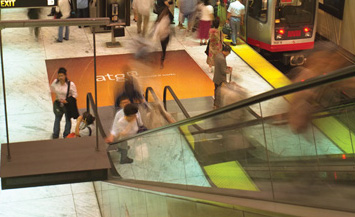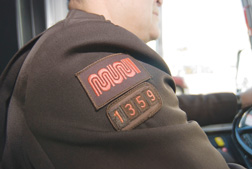|
Note: This page and any Portable Document Format (PDF) or similar files linked from this page are part of an archive and might not contain current information.
On This Page
About Customer Rights and Responsibilities | Expectations | Responsibilities | Commendations and Complaints | Security
About Customer Rights and Responsibilities
Muni strives to provide safe, efficient, reliable and accessible transit service. Efforts include focusing on vehicle maintenance (including maintenance of accessibility equipment), and on providing timely information about service changes and special events. In addition Muni emphasizes the requirements of the Americans with Disabilities Act (ADA) and disability awareness in all operator training programs. Through these efforts Muni works to provide our customers with a high level of service.

Wheelchair user boarding Muni bus
Expectations
Customers can expect operators to:
- Be courteous and respectful to passengers;
- Allow time for customers with disabilities to find a seat or handhold before moving the vehicle;
- Call out major stops, intersections and transfer points;
- Perform the three following tasks upon request:
- lower the lift, ramp or kneeler for boarding or exiting passengers
- provide assistance with wheelchair accessibility equipment (flip seats, clamps, belts)
- ask other passengers to surrender priority seats for seniors and people with disabilities
Note: There are a few stops where lift and ramp deployment is not recommended because of steep grades or insufficient space for the customer to get off the lift once it has been lowered. These stops are clearly marked by the stop bar with hazard triangle symbol painted on the street.

Embarcadero Muni station boarding platform
Responsibilities
We also ask you, our customer, to follow Muni rules, to be aware of your fellow passengers and to be sure to communicate your transit needs to operators.
We ask Muni customers to:
- Be courteous and respectful to Muni operators and to other passengers;
- Have cash fare (and ID with a discount fare), pass or other proof of payment ready to show the operator before boarding;
- Let the operator know if you require the use of the kneeler, lift or ramp to board;
- Ask the operator to remind passengers that the priority seats must be vacated for seniors and people with disabilities. If you need a priority seat and none are available, keep in mind that the priority seats may be occupied by other seniors or people with disabilities, and that the operator cannot force anyone to surrender a seat for you;
- Tell the operator if you need help lifting flip seats at a wheelchair securement or seating area;
- Let the operator know if you need help with the wheelchair securements;
- Tell the operator as soon as you board where you would like to get off the bus or train (it is often helpful to remind the operator when the vehicle is getting closer to your destination);
- Ask the operator to call out a particular stop if needed; and
- Use caution when the vehicle is moving.
Commendations and Complaints
Muni relies on feedback from customers, both negative and positive, to help us continue to provide good transit service. We encourage customers to let us know if they encounter difficulties with an operator or have problems with faulty equipment. To report an equipment problem, or make a complaint about an operator, please provide the following information:
- The time, date and location of the incident;
- The line designation (letter or number) and the direction of travel (e.g. inbound or outbound; north, south, east or west);
- The number of the vehicle. On buses the four digit vehicle number is on the front and back of the coach exterior and above the windshield inside the coach. A metal plate with Braille and raised characters is installed approximately 60 inches above the floor behind the operator compartment on buses and light rail vehicles.
- The operator’s cap number (a four digit number on the shirt sleeve or cap);
- A general description of the operator;
- A description of the incident; and
- Your contact information.

Muni bus identification number in raised print and Braille
Muni staff will attempt to identify the operator using the information you provide, so the more information you can give the better. Muni Passenger Services staff will send you a letter acknowledging receipt of your report and indicating appropriate action taken.
Customers can file a complaint by phone at 311 (TTY 415.701.2323) or at www.sfmta.com. For complaints specifically related to accessibility please contact Accessible Services at 415.701.4485 (TTY 415.701.4730).
For customer complaints about possible ADA violations by the operator, SFMTA management will attempt to identify the operator using the information provided. If the operator is identified the customer will be invited to attend an administrative hearing with the operator, his or her union representative and a neutral hearing officer. The hearing officer will hear testimony from all the parties and make a determination.

Muni operator identification number
Security
Security on board Muni vehicles and in stations is provided by the Muni Response Team (MRT). The MRT is comprised of San Francisco Police Department officers and provides a regular police presence to reduce criminal opportunity and promote safety and security.
In addition, the Muni Transit Assistance Program (MTAP) assigns young adults from disadvantaged neighborhoods to ride Muni vehicles during certain hours in order to diffuse tension and discourage violence and vandalism on the Muni system. MTAP staff will assist Muni operators by insuring the front seats are made available for seniors and persons with disabilities in accordance with the Americans with Disabilities Act.

Muni Response Team member on the T-Third
Continue to Chapter 6: Service Animals on Muni
Return to Table of Contents
|





